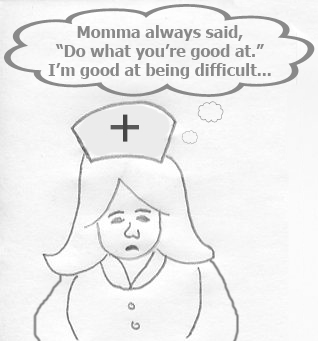
During Missy's night shift, a troublesome
patient, "Gloria" arrived clutching a
handbag. When the patient refused to
surrender the purse, Missy gave up trying
and let her keep it instead of calling for
back up.
As
Gloria became more frustrating to deal with,
Missy essentially gave up trying, doing
neither a thorough body exam nor reading all
of the patient's history. As the
morning shift took over and Missy headed
home, notes about Gloria were minimal.
That
morning, feeling like she wasn't getting
enough attention, Gloria faked losing
consciousness, causing a great deal of
commotion as emergency staff rushed in to
examine. During the hour that they
were all trying to treat her, it eventually
became evident that she
was faking. Had Missy
read the history, she would have learned and,
hopefully, shared with others that the
patient had a history of faking
symptoms for
attention. What's more, the purse was
discovered in the midst of all this and a
sharp, potentially-dangerous object was found in it.
Claudia felt obliged to take this to
management; Missy had not only been
negligent on several levels but also became
defensive instead of apologetic when it was
brought up. Their manager, "Don", said
that he wanted Claudia to be present when
Missy would be called into his office (two days
later). What's more, he informed
Claudia that he wanted her to lead the
questioning. Probably not a fair
position to put her in, but Claudia didn't
want to be contrary.
As
we were talking (which was about two hours
before the big showdown), Claudia became more
and more stressed. She was concerned
about how to lay out the list of accusations
without it turning into a fight that would
make it hard to work with Missy in the
future.
In
coaching her, I helped her to see that
accusations were not the solution.
Instead, I suggested an approach that would show
how what happened made Claudia unable to
work effectively. We scripted
something like this and then practiced
saying it:
"Missy, when I start a day shift and I don't
have all the facts from the night before that I need to make sure
that I'm able to give patients the best
possible care, I feel frustrated and uneasy.
Doing my best work is important to me -- not only
for my career but for the patients and the
families that I have to answer to. I
need to work in an environment where I know
I can come in ready to be fully informed by
the processes and notes from the night
before. That makes sense, right?"
How
could Missy argue such a clear statement of
good work ethics, especially when Claudia,
thus far,
hasn't even mentioned Missy or the incident at
all? Missy almost had to (and did) say,
"Right."
"Glad we're agreed on that. So what
I'd like to do is review what happened with
Gloria the other night because it left me
feeling unsettled and not able to do my job
well. Let's see if we can come up with
a few things that could have gone
differently during the night shift so that
the morning could have gone better for the
five people who ended up working on Gloria."
Facing a logical discussion of what steps
would be best, rather than accusations
launched at her, Missy was only mildly
defensive, actively participated in the
discussion, apologized somewhat for falling
short of the mark, and best of all boosted her
efforts regarding patient assessments in the
following weeks to quite satisfactory levels.
The takeaway? An "I"
centered discussion is much less likely to yield a combative
reaction than a "you" centered one. When we
focus on how to make things better rather than what people
did wrong, there's a safety zone for a listener to let down
defenses.
This
is true from the platform as well. I
re-titled my most popular keynote two years
ago from
"You Gotta Fail...To Succeed!" to
"We Gotta Fail...To Succeed!" because it hit
me one day how judgmental that sounded...as
if it didn't apply just as much to me!
(Now
please return to your email to read the
much shorter articles in the rest of the original eZine!)

 Get Milo's eZine,
Get Milo's eZine,
free
podcasts, and more!



 Contact Info
Contact Info
 Milo's Books
Milo's Books




Copyright
2015



